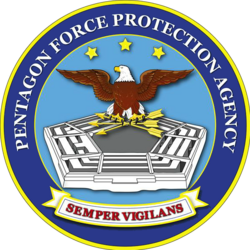| Pentagon Force Protection Agency | |
|---|---|
 "Protecting Those Who Protect Our Nation" | |
| Abbreviation | PFPA |
| Motto | Semper Vigilans Latin for Always Vigilant |
| Agency overview | |
| Formed | May 3, 2002 |
| Preceding agency | |
| Jurisdictional structure | |
| Federal agency (Operations jurisdiction) | United States |
| Operations jurisdiction | United States |
| Legal jurisdiction | The Pentagon and National Capital Region |
| General nature | |
| Operational structure | |
| Headquarters | The Pentagon |
| Agency executives |
|
| Parent agency | Department of Defense |
| Child agency | |
| Website | |
| www | |
| [1] | |
The Pentagon Force Protection Agency (PFPA) is a federal law enforcement agency within the United States Department of Defense charged with protecting and safeguarding the occupants, visitors, and infrastructure of the Pentagon, the Mark Center Building, the Defense Health Agency headquarters, the United States Court of Appeals for the Armed Forces and other assigned DoD-occupied leased facilities within the National Capital Region. As of 2004 [update] , the Pentagon Force Protection Agency employed 482 police officers. [2]
Contents
This mission is accomplished with law enforcement officers (United States Pentagon Police), criminal investigative and protective services agents; threat management agents; CBRN defense and explosives technicians; and anti-terrorism/force protection and physical security personnel.
The Pentagon Force Protection Agency provides a comprehensive protective intelligence analysis capability, which includes threat analysis, threat investigation, and criminal intelligence services to protect Pentagon facilities, employees and senior DoD personnel. The Pentagon Force Protection Agency liaises with other federal law enforcement and intelligence communities and conducts threat assessments and investigations for protective details while they are in the National Capital Region.